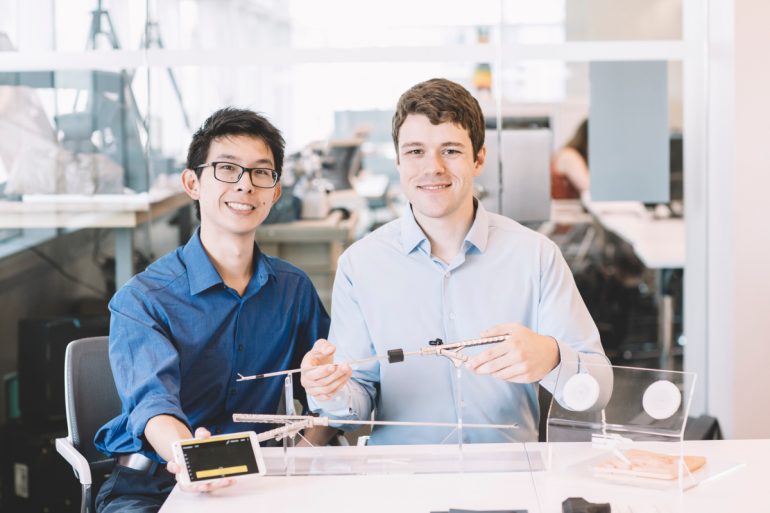Two University of Toronto PhD students are taking home the Canadian national James Dyson Award for Forcefilm. The technology is a thin surgical instrument add-on that accurately measures forces exerted on tissue from minimally invasive surgery.
Robert Brooks and Justin Wee built the patent-pending design. The device retrofits any standard rigid MIS instrument, and the forces detected by the film are wirelessly communicated to the surgeon, providing live force feedback that allows the surgeon to determine exactly when dangerous levels of force are nearing.
“Unlike most medical sensors, ForceFilm is uniquely economical and environmentally friendly because it can be steam sterilized and reused,” Brooks said. “We will be using the prize money to make ForceFilm last even longer. This will allow us to try different formulations and constructions of film and build test apparatuses to repetitively test them for abrasion and steam resistance, with the goal of having ForceFilm last a full year in surgical use.”
Forcefilm will receive $3,400 for winning the prize, and move on to the next stage of the James Dyson Award, where a panel of Dyson engineers will select an international shortlist of 20 projects.
The grand prize of the international competition is $50,000 for the students, and $8,500 for their school.
Four Canadian runners-up will join ForceFilm at the next stage, including:
- The sKan – McMaster University: assists physicians and the average individual with detecting melanomas by creating a thermal map of the region of interest on the skin.
- Primo – OCAD University: replaces the nut at the end of the truck of a skateboard, effectively providing a ‘training wheel’ for the skateboard, which allows a user to adjust granular tension on the wheels.
- Avro Life Science – University of Waterloo: A Transdermal Drug Delivery System that uses a novel polymer matrix to deliver various small molecules through the skin and directly into the bloodstream. The first patch takes the form of a medicated sticker, to deliver seasonal allergy medication to children.
- Design and Build of an Atmospheric Water Generator – University of Waterloo: This Atmospheric Water Generator uses a Peltier device to perform condensation and was found to be capable of producing up to 3L of drinking water within a 24 hour period.
“Winning the national James Dyson Award means we can get the word out about our technology and how ForceFilm can have a life-saving impact on minimally invasive surgery,” said Brooks.
Brooks and Wee have had three major revisions of the prototype since they began production two years ago, with each revision involving modification on the circuit board. The first generation of the technology was used in an education study with 19 urologists at the Hospital for Sick Children. The proof-of-concept study revealed a significant difference between the force application of novice, intermediate, and expert surgeons.
The international winner and finalists will be announced on October 26, 2017.


